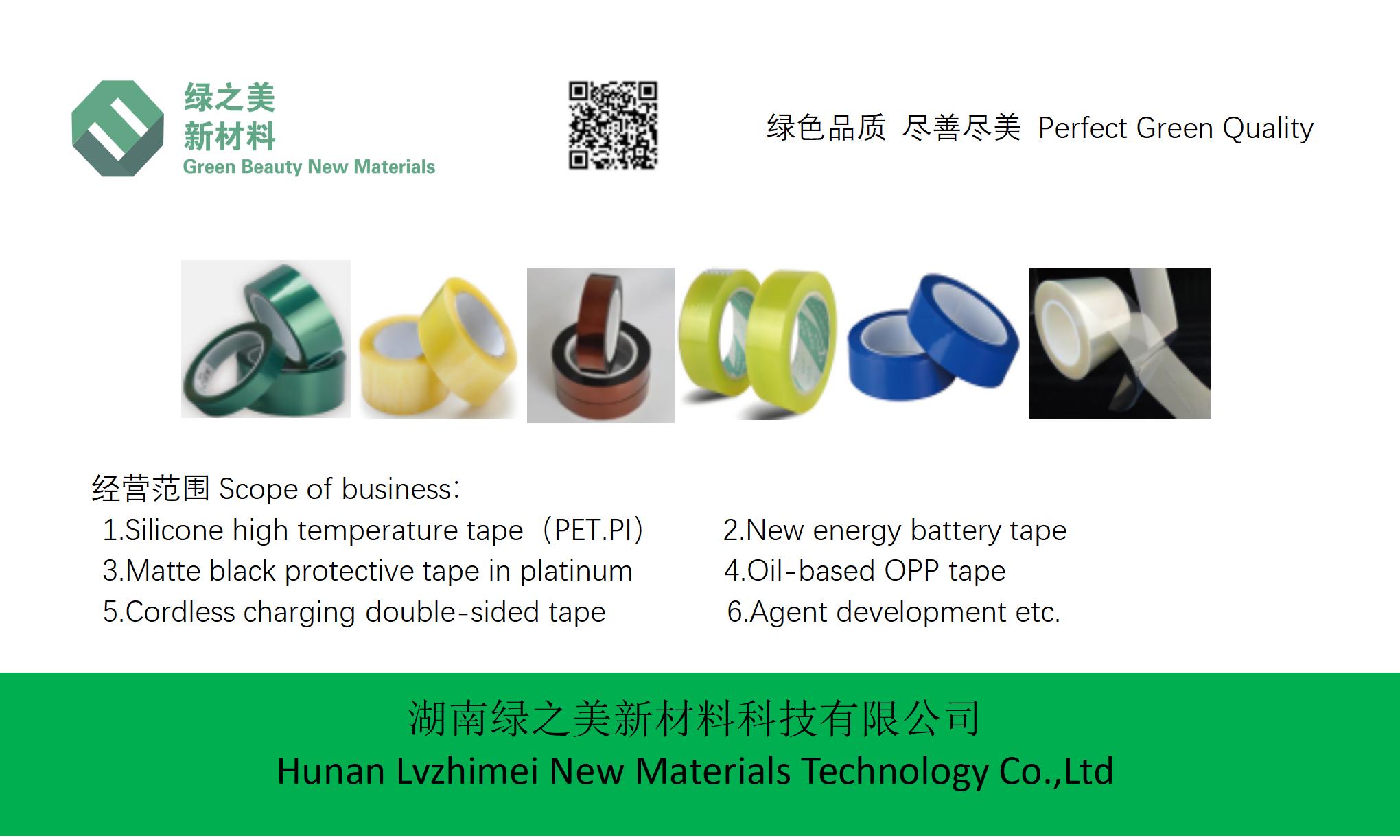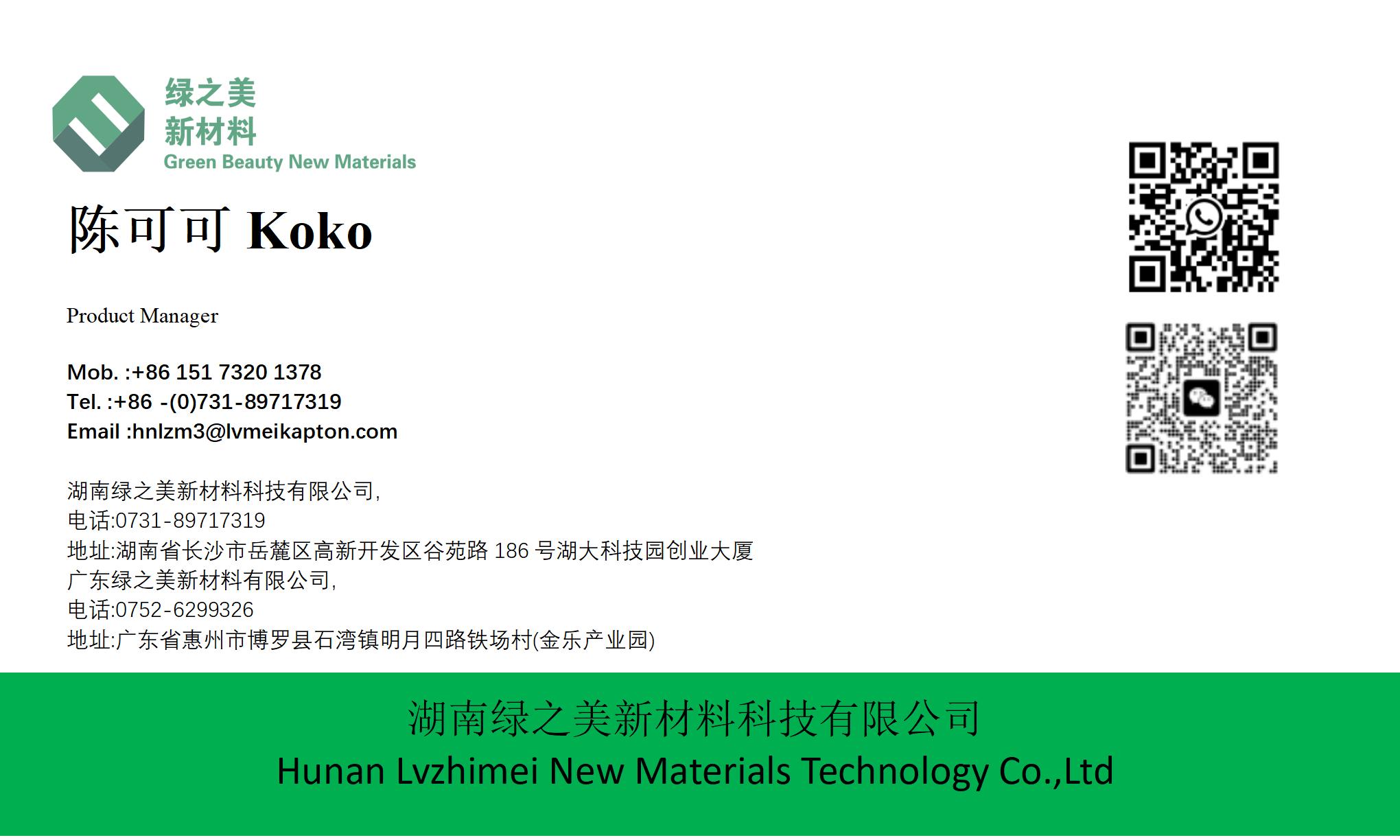hnlzm@lvmeikapton.com
+86 13787123465


Hunan Lvzhimei New Material Technology Co., Ltd.


NameDescriptionContent
Which Industries Drive Demand for High-Performance Kapton Tape? |https://www.lvmeikapton.com/
Source:
|
Author:Koko Chan
|
Published time: 2025-06-25
|
7 Views
|
Share:
Kapton tape is based on polyimide film and possesses numerous outstanding properties. Its exceptional high-temperature resistance enables stable performance within the extreme temperature range of -200℃ to 260℃ and maintains long-term stability at 220℃. This makes it suitable for applications in harsh thermal environments. In terms of chemical resistance, Kapton tape exhibits excellent resistance to most chemicals, including strong acids, alkalis, and organic solvents. Its electrical insulation performance is also superior, featuring high dielectric strength and voltage resistance to prevent electrical faults such as short circuits. Additionally, Kapton tape demonstrates good mechanical properties: it is flexible yet strong, capable of conforming to complex surfaces without tearing or damage. These characteristics make Kapton tape an indispensable high-performance material across various industries.
 Key Takea
Key Takea
Which Industries Drive Demand for High-Performance Kapton Tape?
I. Basic Characteristics and Advantages of Kapton Tape1.1 Introduction to Kapton Tape CharacteristicsKapton tape is based on polyimide film and possesses numerous outstanding properties. Its exceptional high-temperature resistance enables stable performance within the extreme temperature range of -200℃ to 260℃ and maintains long-term stability at 220℃. This makes it suitable for applications in harsh thermal environments. In terms of chemical resistance, Kapton tape exhibits excellent resistance to most chemicals, including strong acids, alkalis, and organic solvents. Its electrical insulation performance is also superior, featuring high dielectric strength and voltage resistance to prevent electrical faults such as short circuits. Additionally, Kapton tape demonstrates good mechanical properties: it is flexible yet strong, capable of conforming to complex surfaces without tearing or damage. These characteristics make Kapton tape an indispensable high-performance material across various industries.
1.2 Importance of Kapton Tape in Industrial ApplicationsIn the electronics industry, Kapton tape is commonly used for insulation protection of electronic components and circuit boards, effectively preventing damage from environmental factors like high temperatures and moisture to ensure stable operation of devices. In aerospace, its high-temperature resistance and chemical corrosion resistance are crucial for insulating and protecting critical components such as aircraft engines and avionics systems, ensuring the safety and reliability of aerospace equipment. The automotive industry, with advancing electrification, increasingly relies on Kapton tape in components like sensors and engine control units to enhance the reliability and lifespan of automotive electronics. Overall, Kapton tape’s superior performance provides essential support for product stability and safety, driving industrial advancement.
II. Specific Demand for Kapton Tape in Various Industries2.1 Aerospace IndustryIn aerospace, Kapton tape plays a pivotal role due to stringent material requirements. The industry must meet stringent aviation standards, and Kapton tape’s polyimide film substrate exhibits specific creep behavior under different initial stresses, vital for aerospace structures. Innovations like FlywaysAI systems in aviation intelligence also leverage Kapton tape in advanced flight planning applications.
Kapton tape is extensively used for insulation and protection in aircraft engines and avionics systems. Its high-temperature resistance ensures equipment stability in extreme environments, while superior electrical insulation performance mitigates failures in complex electromagnetic conditions. Its flexibility accommodates intricate aerospace component geometries. For spacecraft subjected to high vacuum, electromagnetic radiation, and other harsh conditions, Kapton tape and its composite materials provide essential surface protection, safeguarding mission success.
2.2 Automotive IndustryKapton tape finds widespread application in the automotive sector. In traditional combustion engines, it protects engine control units, ensuring electronic systems function reliably in high-temperature and oily environments.
However, its role is more critical in electric vehicles (EVs). Battery systems, the core of EVs, demand high-insulation materials. Kapton tape excels in battery insulation, preventing short circuits and safety hazards. Its mechanical strength stabilizes complex battery pack structures, resisting vibration-induced failures. As automotive electrification accelerates, demand for Kapton tape in battery applications is expected to surge.
2.3 Electronics ManufacturingThe electronics industry heavily relies on high-performance Kapton tape. In PCB fabrication, it plays a crucial role. PCBs, the foundation of electronic devices, require robust insulation during processes like soldering and reflow, where temperatures exceed 260℃. Kapton tape maintains stability, preventing insulation layer degradation and ensuring electrical integrity.
In component manufacturing, miniaturization and integration trends demand precise, reliable insulation. Kapton tape’s high precision and mechanical properties meet these needs, supporting advanced technologies like 5G. Its role in protecting sensitive electronics from thermal and electrical stress is indispensable, driving steady demand growth.
2.4 Renewable EnergyKapton tape significantly enhances performance in renewable energy equipment. For solar inverters—critical components converting DC to AC—it provides essential insulation. Outdoor exposure to heat, moisture, UV radiation, and corrosive environments demand materials with durability. Kapton tape’s resistance to these factors ensures long-term inverter reliability, boosting solar system efficiency.
In wind turbines, Kapton tape insulates and protects components subjected to fluctuating weather conditions. Its ability to withstand mechanical stress and environmental degradation extends turbine lifespan. As global energy transitions favor renewables, demand for Kapton tape in solar and wind installations will continue to rise.
2.5 Medical DevicesDemand in the medical industry stems from Kapton tape’s biocompatibility. Medical devices directly contact or interact with the human body, necessitating materials that meet stringent biocompatibility standards. Kapton tape, with its non-toxic, inert properties, is widely used in diagnostic equipment (e.g., MRI machines, ECG devices) and treatment instruments (e.g., surgical tools, radiation therapy components).
It insulates electronic components, ensuring stable electrical systems critical for accurate diagnostics and safe treatments. Advancements in medical technology, particularly in miniaturized implantable devices, will further drive demand for high-precision, biocompatible Kapton tape solutions.
III. Industry Demand Data Analysis3.1 Demand Share by IndustryMarket research indicates that in 2023, the aerospace industry accounted for approximately 25% of Kapton tape demand. Materials like Kapton tape are essential for avionics and engine systems. The automotive sector, including EVs, contributed around 30%, reflecting electrification trends. Electronics manufacturing (20%) relies on Kapton tape for PCB and component protection. Renewable energy (15%) uses it in solar inverters and wind turbines. Medical devices (10%) utilize it for biocompatible insulation.
3.2 Demand Trend AnalysisAerospace demand is expected to grow steadily as advanced aircraft require lighter, higher-performance materials. The automotive industry, particularly EVs, will drive rapid Kapton tape expansion, with battery insulation becoming a key growth driver. Electronics manufacturing, spurred by 5G and AI, will seek thinner, higher-insulation tapes. Renewable energy projects, aided by global decarbonization policies, will increase outdoor equipment reliance on durable Kapton tape. Medical device demand will rise with technology advancements, favoring precise, biocompatible tapes.
IV. Industry Case Studies and Expert Insights4.1 Successful Application Cases
●
Aerospace: SpaceX’s rocket engines utilize Kapton tape for critical component insulation, ensuring reliability in extreme launch temperatures and vacuum conditions.
●
Automotive: Tesla’s battery systems rely on Kapton tape to prevent thermal runaway and electrical faults, enhancing EV safety.
●
Electronics: Apple’s PCB manufacturing incorporates Kapton tape to protect high-density circuits during assembly, maintaining product performance.
●
Renewable Energy: Sungrow’s solar inverters use Kapton tape to withstand outdoor weathering, boosting system lifespan.
●
Medical Devices: GE Healthcare’s MRI machines utilize Kapton tape for electronic insulation, ensuring diagnostic accuracy in electromagnetic environments.
4.2 Expert Opinions on TrendsIndustry experts predict substantial growth in EV and renewable energy sectors. As EV batteries evolve with higher energy densities and faster charging, Kapton tape must evolve to thinner,更强绝缘 variants. In renewables, tapes will need enhanced UV and corrosion resistance for prolonged outdoor exposure. Electronics experts emphasize miniaturization-driven demand for ultra-thin, high-precision tapes. Aerospace and medical sectors will seek materials with even greater reliability and biocompatibility, driving continuous innovation.
V. Future Trend Projections5.1 Demand from EVs and IoTThe EV boom will significantly boost Kapton tape demand. Global carbon neutrality goals and expanding EV markets create urgent needs for battery insulation. Tesla’s adoption showcases its pivotal role in battery safety and performance.
The Internet of Things (IoT) expansion will also drive demand. As connected devices proliferate, Kapton tape’s electrical insulation and thermal protection become vital for sensors, circuit boards, and miniature electronics in smart homes, wearables, and industrial IoT systems.
5.2 Technological Advancements Impacting DemandAdvances in aerospace materials will favor lighter, multifunctional Kapton tapes for next-generation aircraft. EV battery tech (e.g., solid-state batteries) will demand tapes with superior thermal management properties. Electronics miniaturization will necessitate tapes thinner than 25μm without compromising insulation. Renewable energy systems integrating AI for monitoring may require tapes with integrated sensors, opening new applications. Medical devices adopting flexible electronics will seek biocompatible tapes with conformable properties.
VI. Conclusion6.1 Summary of Industry DemandAerospace demands Kapton tape for extreme thermal and chemical resistance. Automotive (especially EV batteries) prioritize its insulation and safety properties. Electronics manufacturing requires high-precision tapes for PCB and component protection. Renewable energy depends on outdoor durability for solar and wind equipment. Medical devices rely on biocompatibility for electronic insulation.
6.2 Key Role of Kapton Tape in IndustriesIn electronics, it ensures PCB reliability and prevents thermal/electrical failures. Aerospace applications safeguard critical systems for flight safety. Automotive batteries rely on it for accident prevention. Renewable energy systems leverage it for long-term efficiency. Medical devices use it to maintain diagnostic accuracy and patient safety. Overall, Kapton tape is a cornerstone of modern technology across these sectors, enabling performance and safety advancements.
 Key Takea
Key Takea

Hunan Lvzhimei New Material Technology Co., Ltd.
Quick Links
Product Categories
© 2024 Hunan Lvzhimei New Material Technology Co., Ltd.All Rights Reserved. Designed by Erge
0731 - 89717319
hnlzm@lvmeikapton.com
+86 13787123465
Room 502, Chuangye Building, No186, Guyuan Road, High-Tech District, Changsha, Hunan, China
CONTACT



